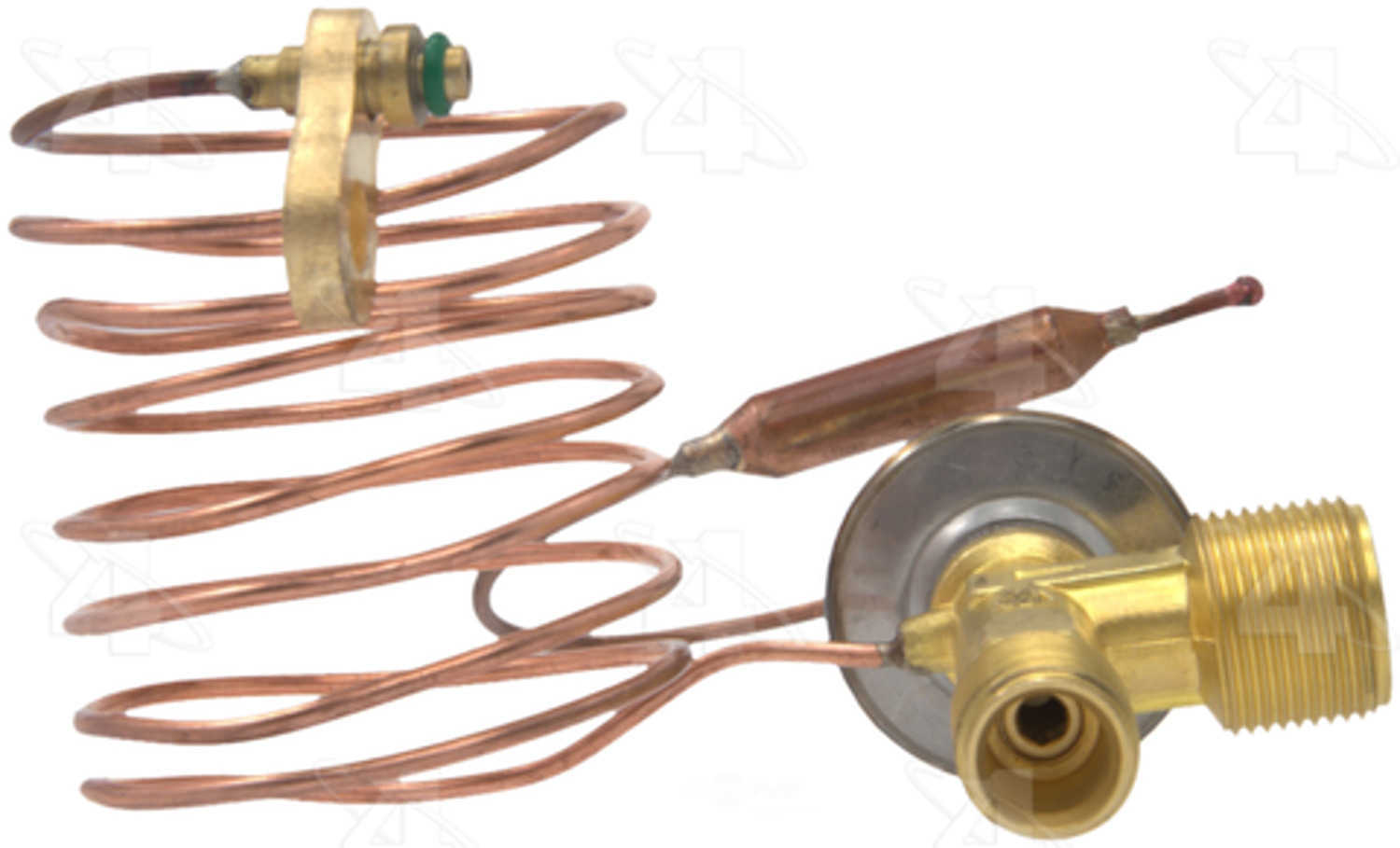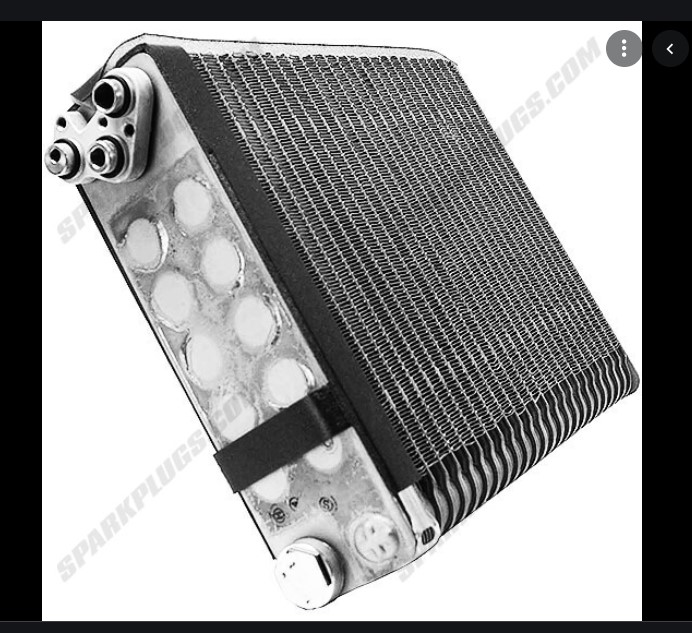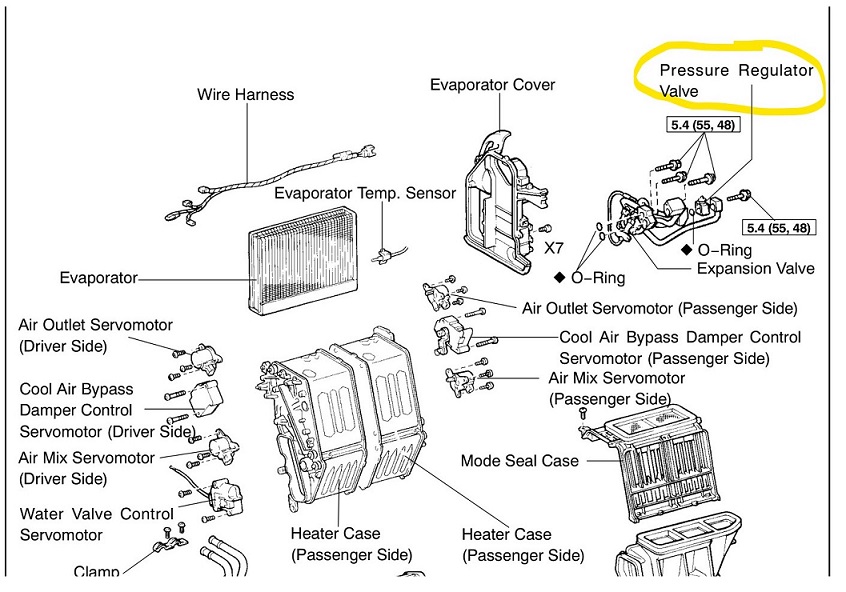Page 1 of 2
How to test EPR (evaporator pressure regulator)
Posted: Wed Aug 25, 2021 8:58 am
by cyfi66
My 1999 Lexus LS400 has an EPR valve located in the suction line between the evaporator and the compressor. It is essentially a POA valve.
I want to test its function but there are no testing instructions in the factory service manual.
The valve is located inline with the suction line and has a capilary tube connected to it which comes from the TXV. Here is what the TXV looks like

The long capilary tube goes all the way from under the dash to the EPR located by the drivers side strut tower. I believe this provides an opening pressure to the valve.
I am thinking that the EPR may be stuck in the middle of its range limiting my system capacity when at full load (keeping the evaporator pressure too high when fully loaded) but works fine once the heat load goes down.
The suction line FEELS the same temperature before and after the EPR.
Any idea how to test this device?
You can see the EPR in this photo (silver cylinder)

Re: How to test EPR (evaporator pressure regulator)
Posted: Wed Aug 25, 2021 12:30 pm
by tbirdtbird
Did some googling. Tons of info for HVAC, not so much for MVAC.
Did find this, it might help. There may be more out there, I only googled for 5 min
http://www.dodgecharger.com/forum/index ... c=134647.0
Am I seeing wires on yours? Might be ECU controlled?
Re: How to test EPR (evaporator pressure regulator)
Posted: Wed Aug 25, 2021 1:08 pm
by cyfi66
Yeah I have seen different variations but not one like this that has a pressure balance input from a capillary tube. What you are seeing there is the capillary tube from the TXV, this is a purely mechanical valve. I suppose I could take it apart and check for movement of the piston but that would require evacuation of the system. I'm looking for some sort of functional check hopefully. I am not even positive that the valve can be taken apart.
Re: How to test EPR (evaporator pressure regulator)
Posted: Wed Aug 25, 2021 1:11 pm
by tbirdtbird
Re: How to test EPR (evaporator pressure regulator)
Posted: Wed Aug 25, 2021 2:57 pm
by tbirdtbird
a pdf right from Denso.
see page 11
It is beyond me why these systems have to be so complicated.
For the retrofits we do here for vintage cars, we have a comp, cond, FD, TXV, evap.
PERIOD. Nothing else is needed!!!
https://www.napabeltshose.com/~/media/n ... ctions.pdf
Re: How to test EPR (evaporator pressure regulator)
Posted: Wed Aug 25, 2021 3:47 pm
by JohnHere
tbirdtbird wrote: ↑Wed Aug 25, 2021 2:57 pm
It is beyond me why these systems have to be so complicated.
For the retrofits we do here for vintage cars, we have a comp, cond, FD, TXV, evap.
PERIOD. Nothing else is needed!!!
Hear, hear!
Re: How to test EPR (evaporator pressure regulator)
Posted: Wed Aug 25, 2021 5:24 pm
by DetroitAC
I had really no idea this sort of thing existed in a Lexus.
I think you are looking at that TXV capillary the wrong direction, it's a pressure sensing line for the TXV, nothing to do with the operation of the EPR. Modern H-block TXVs don't need an external connection, the suction line runs through the top port of the TXV and supplies evap out pressure to the underside of the diaphragm. In this setup, that capillary is supplying EPR out pressure to the underside of the diaphragm.
In commercial TXV applications this is still very common, called an externally equalized TXV by those guys.
Re: How to test EPR (evaporator pressure regulator)
Posted: Wed Aug 25, 2021 10:00 pm
by cyfi66
Thats a fantastic resource from Denso, thanks!! Going to read thoroughly.
And Detroit - ah hah, I think you are correct. I was having trouble figuring out what pressure exactly would be sent to the EPR so it makes total sense that this is a sensing line for the TXV.
The forum link you sent is for an older model LS400 which uses a much different style of EPR valve. The one on the later model like mine is a more compact design and looks much different. Am I right that if the EPR were putting back-pressure on the evaporator that I would see a temperature drop between the inlet and outlet of the EPR? If there is no temp drop then it is essentially acting as a pass through? Even if there was only superheated vapor passing through, would I still see a temperature drop?
But wait theres more. There is also a "pressure regulator" valve attached to the evaporator piping (appears to be on the liquid line?). I have yet to figure out what this does and this is the only place it is mentioned in the service manual. Also, why does the evaporator have three openings/ports on it?
(see attachments)

- evap.jpg (117.43 KiB) Viewed 5187 times

- pressure regulator.jpg (156.45 KiB) Viewed 5187 times
Re: How to test EPR (evaporator pressure regulator)
Posted: Wed Aug 25, 2021 10:44 pm
by bohica2xo
Man, the NVH clowns had a field day with that one. Servos to mix air, add heat and control everything. "cool air bypass" indeed.
To prevent the old ladies in costal california from clutching at their pearls, it is necessary to keep the vents from making the outlet air too "cold" . If it blew air cold enough to make your knuckles hurt we would be happy - but the "bring a sweater that restaurant is too cold" crowd is not.
I would start with making sure all of those servos are calibrated properly, and working.
You may be able to reduce the evaporator temperature somewhat by adjusting the POA valve (if it is adjustable) or tricking a sensor or two. Obviously you can only go so low, but making sure you get all of the cold air it is making is also important.
Get some evaporator pressure readings if that is possible. Do the low speed / high rpm test to rule out drive ratio issues. And keep posting results and information
Re: How to test EPR (evaporator pressure regulator)
Posted: Thu Aug 26, 2021 5:36 am
by DetroitAC
You won't see a temperature drop across the EPR, there will only be a pressure drop.
I think the extra port on the evap is for an IHX integrated into the evap, basically a little heat exchanger transferring heat out of the liquid refrigerant and into suction gas, these are pretty common on current production cars, but they are in the suction line pipe, not in the evaporator. Evaporator room is usually too precious to fit something like this, takes space away from cross car structural beam, infotainment, glove box, airbags, etc.
This IHX is the same thing as wrapping a capillary tube around the suction pipe in commercial refrigeration, been done that way for 50 years, it increases the liquid subcooling (this is a positive thing) at the expense of increasing the suction superheating (this is a negative thing), the net result is a slight gain.



